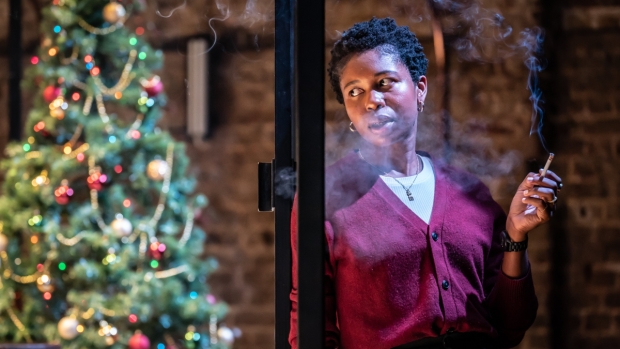”The Clinic” at the Almeida – review

© Marc Brenne
I love the writing of Dipo Baruwa-Etti. It whips and zips across the stage, full of life and thought. In plays such as An unfinished man and Half-Empty Glasses, he’s revealed a willingness to explore difficult themes about being Black in Britain today in challenging ways. A lot was riding on his first play at the Almeida, where he is the Channel 4 resident writer.
Its first act is a belter. Here we meet a British-Nigerian, middle-class family who seem to be perfect examples of Black achievement. Patriarch Segun (Maynard Eziashi) is a best-selling author and therapist, mum Tiwa (Donnar Berlin) volunteers at a women’s shelter, son Bayo is a policeman, his wife (Mercy Ojelade) is a Labour MP, and daughter Ore is a junior doctor. They seem so well-qualified that when Ore offers Wunmi, the widow of a former patient a sanctuary, a bulwark against the despair that is driving her to suicide, they see themselves as a clinic, a place where problems can be solved.
Yet from the very first scene at Segun’s 60th birthday, it’s clear that their goodness and their perceived view of themselves are fragile. They squabble all the time, about little things like Ore’s smoking, but also about larger ones – whether Labour have a right to expect the Black vote, what shape activism should take, whether a system can be reformed from inside or out.
The quarrels take place within the setting of a lively, family gathering, entirely believable, utterly transfixing. The arrival of the fiery Wunmi, with her young baby and her confrontational attitudes in tow, disrupts the uneasy balance still further. There’s a real tension in the writing, brilliantly realised by a production directed by Monique Touko that is sometimes as nerve-wracking as a thriller.
Paul Wills provides a sleek kitchen set, overhung by a huge Nigerian mask, and Matt Haskins’ lighting with occasional electric flashes, Christopher Shutt’s ominous sound design and Shiloh Coke’s score all hint at the sense that there is something beyond what we see, that Wunmi (wonderfully played by Toyin Ayedun-Alase) may be either exploiter or exploited, and that she may or may not represent an avenging force beyond what we see.
At the interval then, the play feels truly intriguing, poised on the brink of revelation. But its second act doesn’t quite deliver. Unlike JB Priestley’s An Inspector Calls (with which it bears some comparison), the stranger’s arrival doesn’t lead to a concentrated howl of outrage. Instead, the anger contained within the play, the burning questions about Black people’s treatment and the ways in which they should fight back, seem to dissipate in too many directions.
Some of the plot twists seem overly conventional, while others feel underwritten and underdeveloped. Interestingly, an epilogue printed in the text, is not performed on stage; it would have tied up some of the play’s thinking.
The power of Baruwa-Etti’s writing never falters, however, and The Clinic is superbly performed. I particularly liked the bickering and shifting sibling relationship between Simon Manyonda, playing a policeman who celebrates when the Black killer of a Black boy is caught and his sister who believes that all systems are corrupt. Gloria Obianyo plays her with exceptional stillness and understanding and both honour the nuance of a relationship that is united by love even as it torn apart by beliefs.
The Clinic is an ambitious undertaking, that never loses the attention, but it doesn’t make the impact Baruwa-Etti’s talent deserves. It’s big, bold and unruly, but not quite as focussed as it needs to be.












